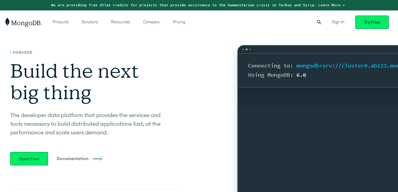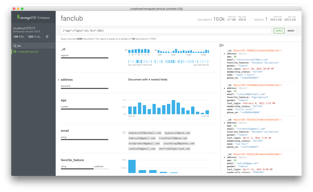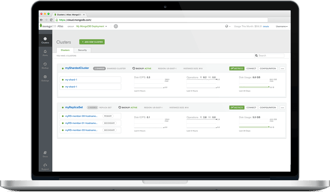

Unclaimed: Are are working at MongoDB ?
MongoDB Reviews & Product Details
MongoDB is a NoSQL database that supports scalable, and high-performance data storage solutions. The platform’s automatic sharing features combined with real-time analytics and horizontal scalability empower businesses with efficient data management.

| Capabilities |
|
|---|---|
| Segment |
|
| Deployment | Cloud / SaaS / Web-Based, Desktop Mac, On-Premise Linux, On-Premise Windows |
| Training | Documentation |
| Languages | English |




Compare MongoDB with other popular tools in the same category.

What I like best is the ease of configuration and lightweight compared to other databases. I was able to get the maximum out of MongoDB features, which do not come with relational DBS as my project requirements.
I have not faced issues with MongoDB, and I could figure out and fix the challenges I face because of strong community support. Therefore no adverse comment on it.
I required a non-relational DB for some of my projects, and MongoDB did it perfectly without issues. Scalability was one of the key benefits I have gained through the use of this database. I am happy with its usage.
I have been using the MongoDB database for quite a while now. The best thing is that you can create and manage the MongoDB database either on your local machine using mongo bash or store it in the cloud using MongoDB Atlas. MongoDB is the best NoSQL database program you can find. With the help of GUIs like NoSQL Booster, one can easily manage MongoDB databases. Also, you can write SQL queries to query the mongo db, which is the best part.If your database doesn't have a fixed schema, MongoDB provides this feature for you to change your schema as and when required, which is really amazing.
I don't feel there is anything, in particular, I dislike about MongoDB. Every database program has its advantages and disadvantages. You will find drawbacks, and if you don't use the proper database according to your needs, as MongoDB is a NoSQL database, it will lack the functionalities of a relational/SQL database.
I have been using MongoDB for most of my projects. Also have used MongoDB in the organizations I worked at. I see many startups now are preferring MongoDB. Hence I believe MongoDB will be in demand in the near future.
Mostly I like the very quick response of data. It feels like work locally. The management of data collection is excellent. You can index any field in a document. MongoDB supports Master Slave replication. A master can perform Reads and Writes and a Slave copies data from the master and can only be used for reads or back up. It has an automatic load balancing configuration because of data placed in shards. MongoDB is a scalable, flexible NoSQL document database platform designed to overcome the relational databases approach and the limitations of other NoSQL solutions. MongoDB is well known for its horizontal scaling and load balancing capabilities, which has given application developers an unprecedented level of flexibility and scalability.
Based on my experience till now, I am not feeling wrong with any features. It uses high memory for data storage. You are not allowed to store more than 16MB data in the documents. The nesting of data in BSON is also limited you are not allowed to nest data more than 100 levels. It does not support join operation.
I have not any bad experiences, so I am not solving any problems with MongoDB. Based on a previously used SQL database, I feel the speedy and quick response in MongoDB. JSON data model with dynamic schemas. Auto-sharding for horizontal scalability. Built in replication for high availability. It is a schema-less NoSQL database. You need not to design the schema of the database when you are working with MongoDB.
It's a NoSQL database system, and it's very easy to scale.
I have found no issues so far. It fits the requirements.
Dealing with data at large scale
short learning curve and good community to support We use it for front-end-heavy projects and storing document based data, where original RDBMS solution would be overkill. The reason for using this is because of the amazing scalability that this database provides and the JSON file format in which it tends to store the data that is present within it. It fully meets our needs. Reliable, handy, and robust, the support is of high quality. You can install a local, database-based environment
A more user-friendly user management tool would be a good thing. No joins Aggregation of data is hard Not 100% ACID compliant although this is also one of the reasons for MongoDB's strength, it would require you to think through your use cases more. If the data is of similar type then it is very difficult to remove the same comments. Transaction not supported on sharded collection If installing it on-prep or on your own account in a public cloud, it can be a daunting experience. Very hard to tell how to best structure your data and then effectively query it.
Data storage for NodeJs applications, saving logs etc. Mongo can integrate with all of the major languages like Java, Python, Javascript. If you need to store very complex, structured data that needs to be related, a traditional relational DB might be a better option.
I love the simpleness and the flexibility and the documentation was great. Extremely easy for new developers to pickup and great support for complex query scenarios.
It is difficult to learn clustering in mongodb. Althogh the documentation is generally great sometimes when looking solutions for complex scenarios it can be time consuming and a bit frustrating.
Work with json easily without awkward constraints such as in mySQL and I love it when I can just loop through the json data from a JavaScript app like react or angular m
MongoDB allows the export of non-relational databases, which is useful for working with code whose format needs to be changed more freely. When creating data strings, they can be exported through lists to a chosen server
The mongo DB platform does not support SQL type databases from services such as MySQL, because with mongo DB it is not possible to carry out the same work procedure based on the server modes offered by these platforms
Mongo DB exists as a software to work with non-relational databases, but it covers much more by leaving aside the slowness brought by the management of DDL type commands. In fact, MongoDB serves to stop working with SQL and experiment with other types of configurations and data formats
It has amazing features. You can use it on memory or disk. As cash server with TTL or as a normal DB. Also, you have a full-text search on your collection. MongoDB is amazing for the projects who don't have a strong style for the beginning for at least the first 5 years. It's easy to use, user friendly, and super fast. Extendable horizontally and vertically.
If you don't want to limit yourself, you can create a big mess in that. Data without style can be really dangerous.
Store lots of data with different kinds of Schema.
The best thing about MongoDB is it gives query output in JSON format which is easy to read. And for the new user they can have it for free with certain storage space.
Although working with MongoDB is very easy but at the beginning learning MongoDB might take some time. One more thing is that the free version limits the storage of data.
As in MongoDB data is encapsulated that's why the queries are much faster and the software is extremely performant. In MongoDB I can make number of structural changes easily to the access data without too much modification in data access layer.
MongoDB is scalable, robust, easy to use, and has well-designed architecture. It can be integrated with many programming languages. The MongoDB community is large. You don't need to stress yourself with where to host your database. It has unique and helpful tools like the MongoDB Compass, to make database administration easy. It is very secured.
Even though technologies have their dislikes, I personally don't have any dislikes with MongoDB.
I use MongoDB as the database for my web applications and CLI apps.
